
Le verbe avoir au passé composé YouTube
Descendre can be used with avoir or être in compound tenses depending on its meaning in French (Le Passé Composé) Most verbs use either avoir or être as the auxiliary verb in Le Passé Composé (Indicatif) (or other compound tense) , but descendre uses both, depending on its grammatical usage * and what it means in the sentence.

avoir au passé composé de l'indicatif Laconjugaison.fr YouTube
Das passé composé ist eine zusammengesetzte Zeitform, das heißt es besteht aus einem Hilfsverb ( avoir oder être) und einem Partizip Perfekt. Als Hilfsverb benutzt man entweder avoir oder être im Präsens. Auf das Hilfsverb folgt dann das Vollverb im Partizip Perfekt, participe passé genannt.
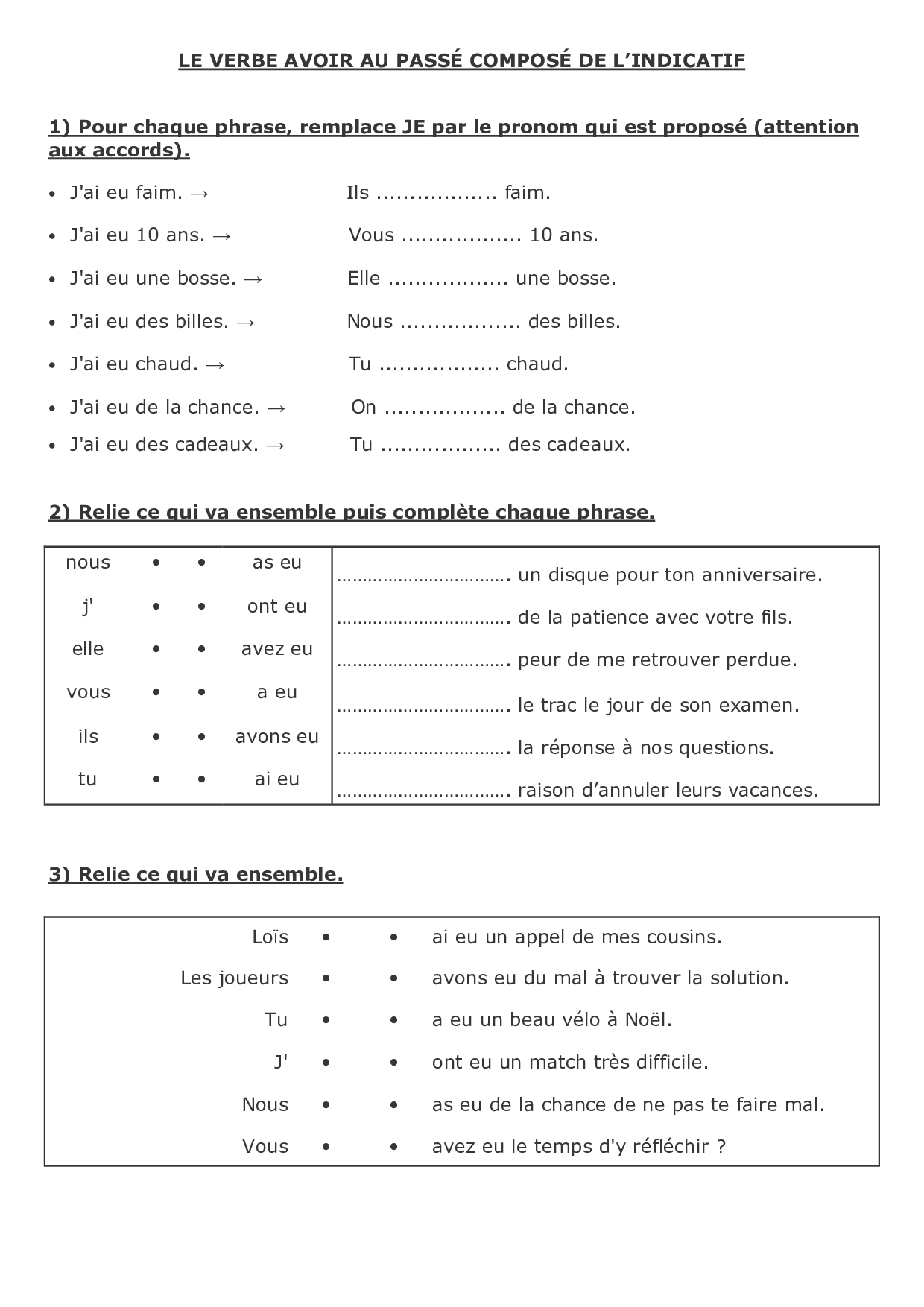
Le passé composé le verbe avoir exercices 1 AlloSchool
Le passé composé se forme avec l'auxiliaire être ou avoir conjugué au présent suivi du participe passé. Dans les phrases négatives, l'auxiliaire est encadré par les deux termes de la négation (ne. pas, ne. jamais, etc.) Exemples : J'ai rigolé. → Je n' ai pas rigolé. Je suis parti.→ Je ne suis pas parti.

Le passé composé avec AVOIR Interactive worksheet
Auch être und avoir bilden das Passé composé mit avoir:. j'ai été (ich bin gewesen), tu as été, il / elle / on a été, nous avons été, vous avez été, ils / elles ont été; j'ai eu (ich habe gehabt), tu as eu, il / elle / on a eu, nous avons eu, vous avez eu, ils / elles ont eu; In der Verneinung des Passé composé umschließt ne. pas das Hilfsverb.

Passé Composé Mit Avoir Übungen Pdf
Passé composé conjugation. To form the passé composé, combine an auxiliary or helping verb ( verbe auxiliaire) with the past participle of the verb. The following is the passé composé of the verb parler (to speak). The past participle parlé is the same for every person and the auxiliary verb avoir (to have) changes in accordance with.

Passe Compose Avoir Regular Verbs Worksheet, Chapter 10 Here We Have Boire Conjugated In Passe
The passé composé is usually formed by following the present tense of avoir with a past participle. j'ai aimé. I loved. tu as aimé. you loved. il/elle a aimé. he/she loved. nous avons aimé. We loved.

Passé Composé Mit Avoir Übungen PDF
To form the passé composé of verbs using avoir, conjugate avoir in the present tense (j'ai, tu as, il a, nous avons, vous avez, ils ont) and add the past participle of the verb expressing the action. Put the words together this way: subject + helping verb (usually avoir) + past participle. The passé composé, a compound past tense, is formed.
blog voor de leerlingen Frans van het derde jaar le passé composé avec avoir(3)
The vast majority of French verbs form the passé composé with avoir. This means that you'll conjugate avoir the way you normally would and then add the past participle, as in the previous example. Let's do one more together: Subject + avoir + past participle [+ additional details] Je + ai + acheté + des fleurs hier.

passé composé (I) mit avoir einfach besser erklärt YouTube
Le Passé Composé - With Avoir and Être (Auxiliary Verbs) Gustav Dahlman December 17, 2023 Grammar No Comments (You can scroll down if you want to see a similar picture for reflexive verbs in le passe composé) So, now you should be able to recognize a past participle: Regarder (infinitive): Regardé (past participle)

Das Passé Composé mit AVOIR Grammatik Französisch YouTube
Conjugation verb avoir in French avoir have; take; give;. Infinitif avoir Participe Présent ayant Participe Passé eu Model : avoir Auxiliary : avoir Other forms: s'avoir / ne pas avoir / ne pas s'avoir Advertising Indicatif Présent j'ai tu as il/elle a nous avons vous avez ils/elles ont Imparfait j'avais tu avais il/elle avait nous avions
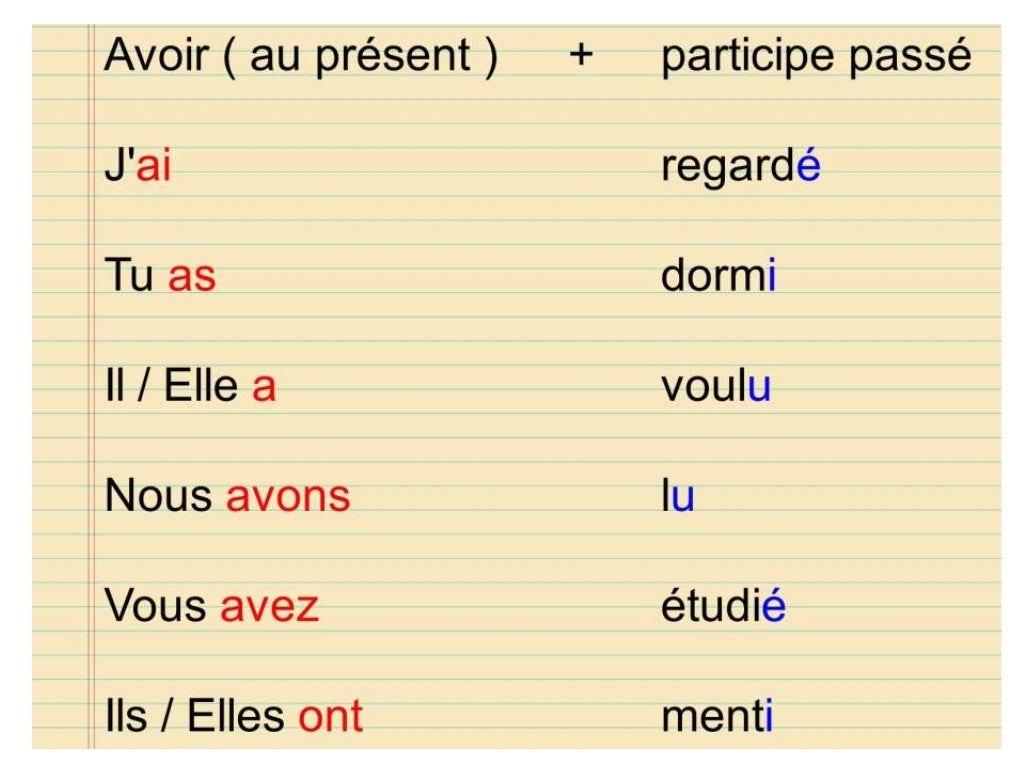
Le passé composé avec avoir
Conjugate the French verb mettre in all tenses: future, participle, present, indicative, subjunctive. Irregular verbs, auxiliary verbs, conjugation rules and conjugation models in French verb conjugation. Translate mettre in context, with examples of use and definition.
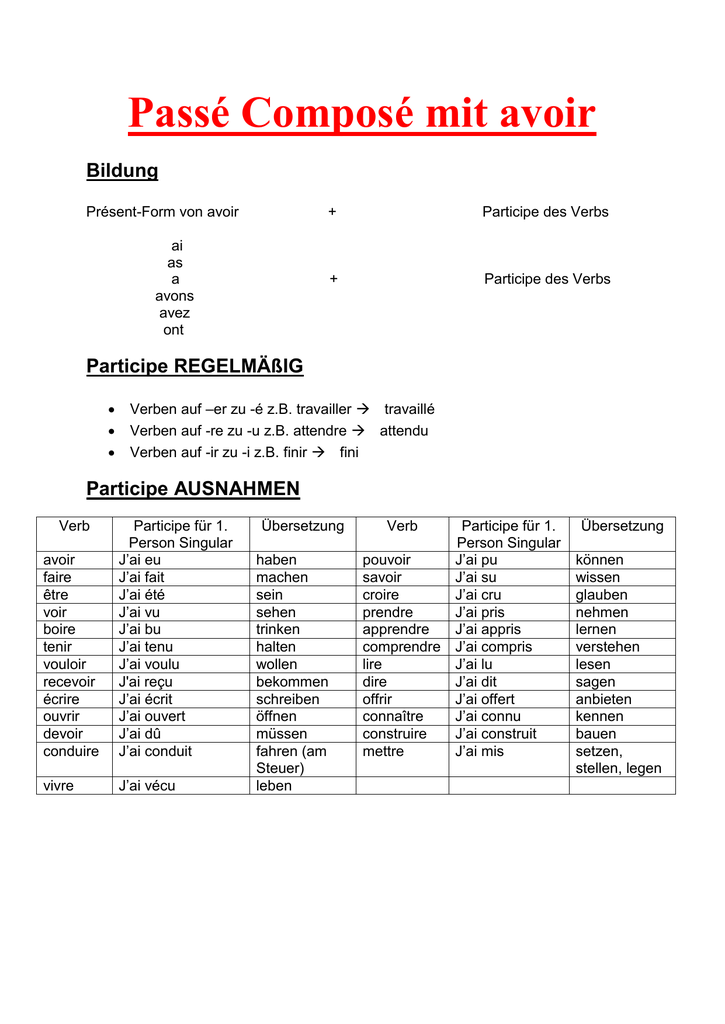
Passé Composé mit avoir Bildung
Participe passé beim Passé composé mit avoir/être ; Passé composé avoir (regelmäßige Verben) Das Passé composé und Bewegungsverben ; Passé composé bei Verben mit unregelmäßigen Partizipien ; Passé composé der reflexiven Verben ; Passé composé der reflexiven Verben Teil2 ; Passé composé mit avoir ; Passé composé mit être

Besonderheit Passé Composé mit avoir ǀ Lernwerk TV
The Passé Composé (Past Tense) is the most common past tense in French. It is used to express an action or event (or a series of actions or events) completed in the past. The Passé Composé (Past Tense) is used in the following instances: 1. With completed actions in the past: J'ai étudié la leçon déjà. I studied the lesson already.
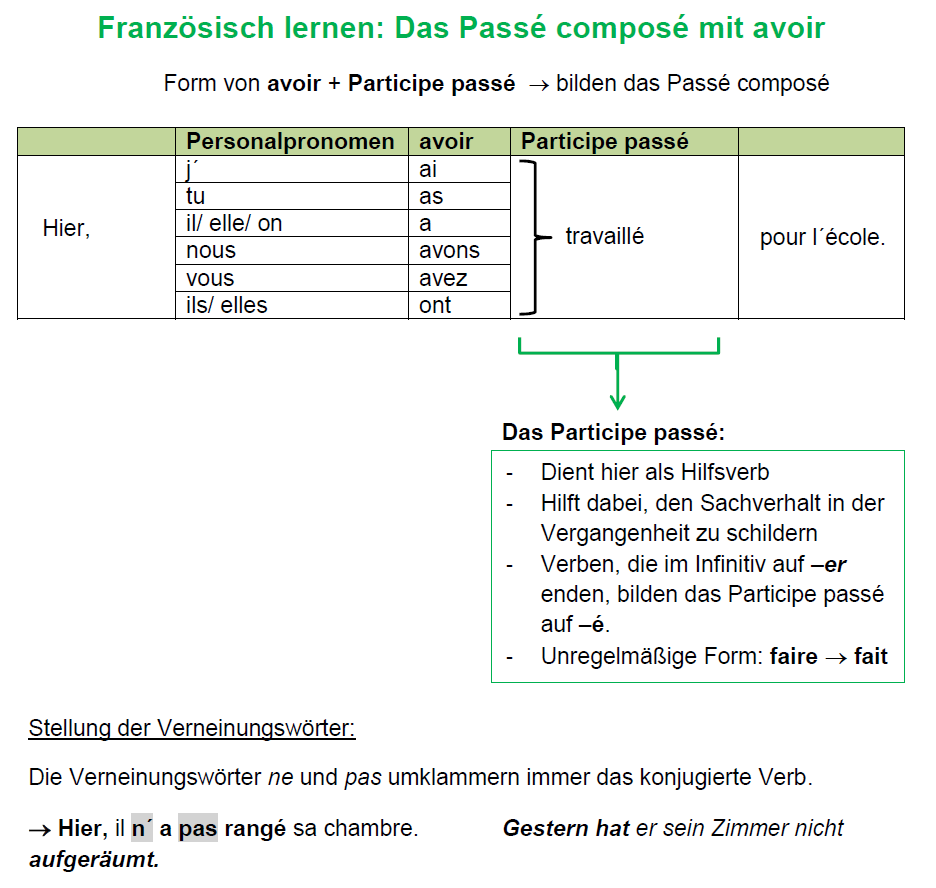
Französisch lernen Das Passé composé mit avoir
To conjugate the passé composé we use the present tense of avoir or être as an auxiliary verb, followed by the past participle (participe passé) of the main verb. In negative sentences, the past participle comes after the second part of the negation (pas). Example: J'ai rigolé. → Je n' ai pas rigolé.

Das passé composé mit avoir / Einfach lernen! YouTube
The passé composé is the most important French past tense, and just to make things interesting, it has three possible English equivalents. - Lawless French. Avoir, Être et le Passé composé (Lesson, 6th-8th grade) En vacances (Lesson, 9th-12th grade) Hobbies (Worksheet, 8th-9th grade)
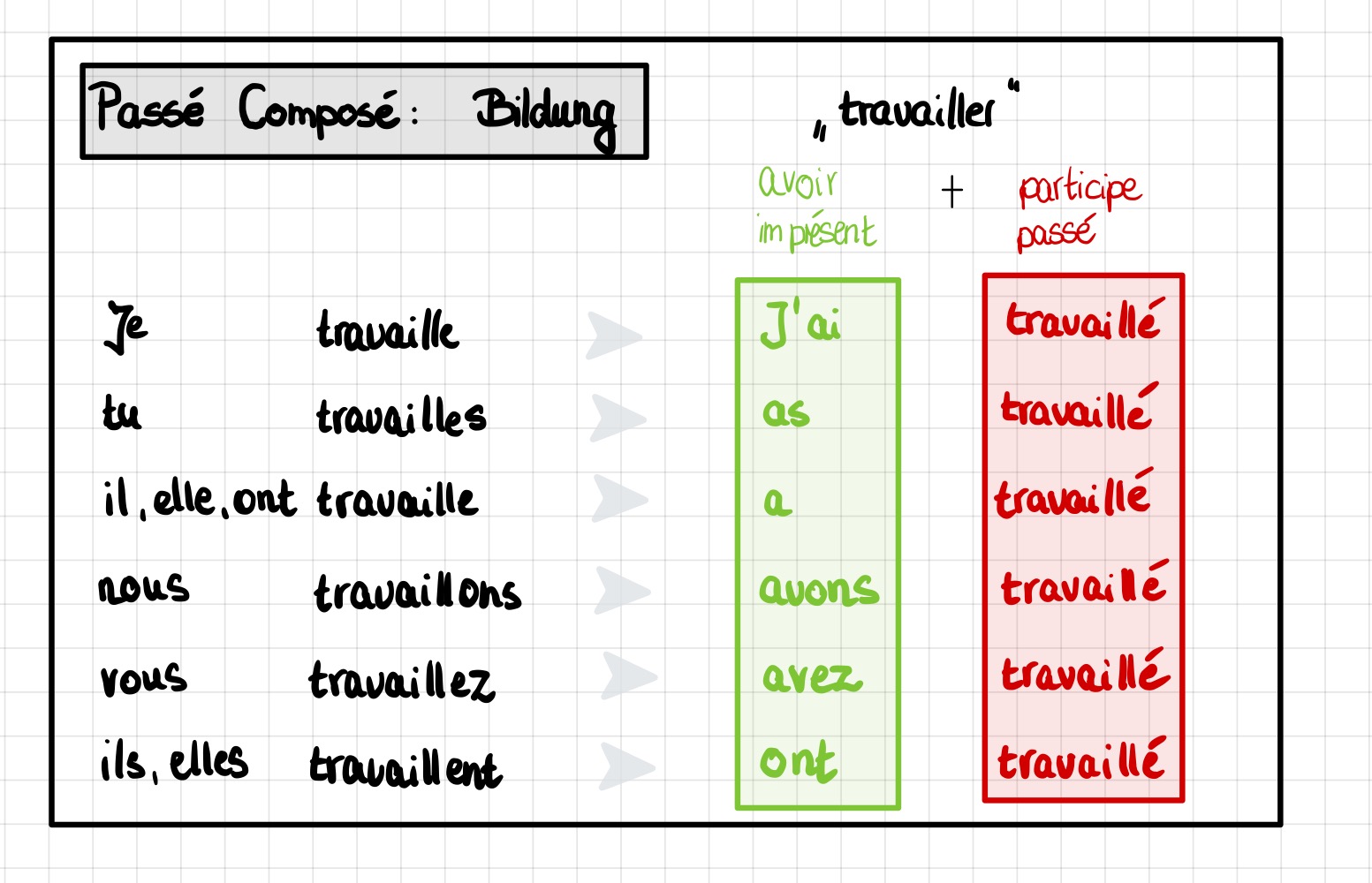
Passé Composé Bildung mit avoir DOS Lernwelt
The passé composé is the most common French past tense, often used in conjunction with the imperfect.It is extremely important to understand the distinctions between past tenses in order to use them correctly and thus express past events accurately. Before you can compare them, however, be sure that you understand each tense individually, as this will make it a lot easier to figure out how.